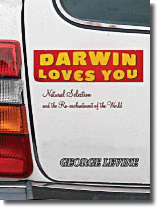I asked George to apply the "page 69 test" to his book. Here is his reply:
Well, if you're a Darwinian, you believe that everything is connected to everything else, and as a Darwinian I agree that p. 69 connects (as, I expect, McLuhan knew that almost any page of any book would connect) to its major arguments,Many thanks to George for the report on Darwin Love You and its page 69.preoccupations, tendencies, and ambitions. Here as throughout, I try to represent Darwin as many-sided, but to emphasize an aspect of his life and writings that the usual focus on his big theory tends to ignore: Darwin loved the natural world. My book insists that you can be a Darwinian and love it too. Whatever bleak inferences people persist in making about a world governed not by God but by natural law, for Darwin the world was a miracle, a joy, and it gave him the kinds of satisfactions that many -- perhaps most -- people think can only be derived from religion. Taking Darwin as a model, p. 69 furthers the book's argument for the possibility of what the political philosophers Jane Bennett and William Connolly call "nontheistic enchantment."
So the hard-nosed Darwin represented on p. 69 is also the Darwin who is "a celebrant of the natural world,...awed and enchanted by the complexity, intelligence, and variety of the lower animals." While Darwin's theories have been used for a lot of things that many will agree are worse than bad, positively terrible -- eugenics, in particular, but also the strongest kind of dog-eat-dog capitalism, there are other and better possible uses of his theory. Virtually everyone has used Darwin to justify positions that he almost certainly wouldn't have endorsed, as he wouldn't have endorsed the eugenics that his cousin, Galton, initiated. Nor would he, in all likelihood, have endorsed Kropotkin's anarchism, which Kropotkin proposed with Darwinian sanction in his book, Mutual Aid. While Darwin was not an "innocent" (and p. 69 emphasizes his unselfconscious acceptance of many of his culture's prejudices), his work can and should be taken as liberating, inspiring, and "enchanting."
I point out on p. 69 that, after clearing away the debris of Darwin's negative reputation, the second half of the book will be devoted to locating in Darwin's own work a model for nontheistic enchantment. And this I try to do by looking closely at the language he actually used to create and argue his brilliant (and sometimes frightening theory), and at some of his personal experiences, most particularly and sadly, the death of his beloved ten year old daughter. Paying attention to the romantic Darwin, one can break free from the assumption that value only inheres in a world understood religiously. The spiritual emptiness and disenchantment that Max Weber saw in the modern scientifically oriented world is not there in Darwin's. Darwin, I argue, loves the world, and we might well learn from him even more than the theory of evolution by natural selection. We might learn to love the world, and for its own sake.
Adam Gopnik praised the book in the New Yorker:
Darwin Loves You ... tries to vindicate Darwin for students of literature by emphasizing his modest “sense of wonder,” the almost mystical awe at the sheer existence of life in the universe; Darwin disenchanted believers in Heaven, but he reënchanted lovers of Earth. Levine’s book is one of the most appealing and subtle attempts to bridge biology and the humanities. It proposes an “enchanted secularity”; because Darwin robs mankind of place and purpose, he gave us a chance to love and revere nature “precisely in its refusal to be like us.”For more endorsements, click here and here.
Click here to read Chapter One of Darwin Loves You.

Among Levine's other books are: Dying to Know (Chicago, 2002); The Cambridge Companion to George Eliot (Cambridge, 2001); Darwin and the Novelists (Harvard, 1988); The Realistic Imagination (Chicago, 1981); Lifebirds (Rutgers, 1997). He also wrote introduction and notes for The Origin of the Species (Barnes and Noble, 2004).
Previous "page 69 tests":
John Barlow, Intoxicated
Alicia Steimberg, The Rainforest
Alan Wolfe, Does American Democracy Still Work?
John Dickerson, On Her Trail
Marcus Sakey, The Blade Itself
Randy Boyagoda, Governor of the Northern Province
John Gittings, The Changing Face of China
Rachel Kadish, Tolstoy Lied
Eric Rauchway, Blessed Among Nations
Tim Brookes, Guitar and other books
Ruth Padel, Tigers in Red Weather
William Haywood Henderson, Augusta Locke
Jed Horne, Breach of Faith
Robert Greer, The Fourth Perspective
David Plotz, The Genius Factory
Michael Allen Dymmoch, White Tiger
Patrick Thaddeus Jackson, Civilizing the Enemy
Tom Lutz, Doing Nothing
Libby Fischer Hellmann, A Shot To Die For
Nelson Algren, The Man With the Golden Arm
Bob Harris, Prisoner of Trebekistan
Elaine Flinn, Deadly Collection
Louise Welsh, The Bullet Trick
Gregg Hurwitz, Last Shot
Martha Powers, Death Angel
N.M. Kelby, Whale Season
Mario Acevedo, The Nymphos of Rocky Flats
Dominic Smith, The Mercury Visions of Louis Daguerre
Simon Blackburn, Lust
Linda L. Richards, Calculated Loss
Kevin Guilfoile, Cast of Shadows
Ronlyn Domingue, The Mercy of Thin Air
Shari Caudron, Who Are You People?
Marisha Pessl, Special Topics in Calamity Physics
John Sutherland, How to Read a Novel
Steven Miles, Oath Betrayed
Alan Brown, Audrey Hepburn's Neck
Richard Dawkins, The Ancestor's Tale
--Marshal Zeringue






